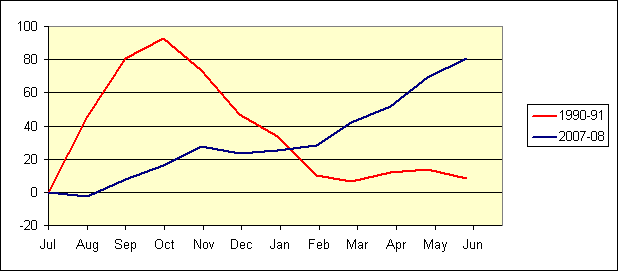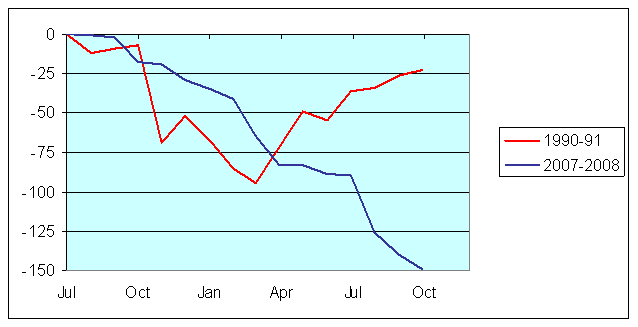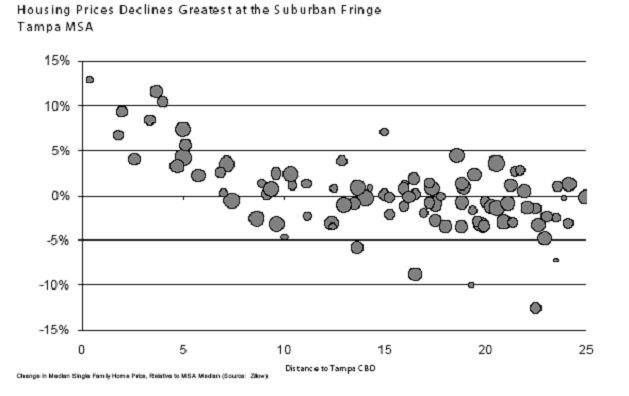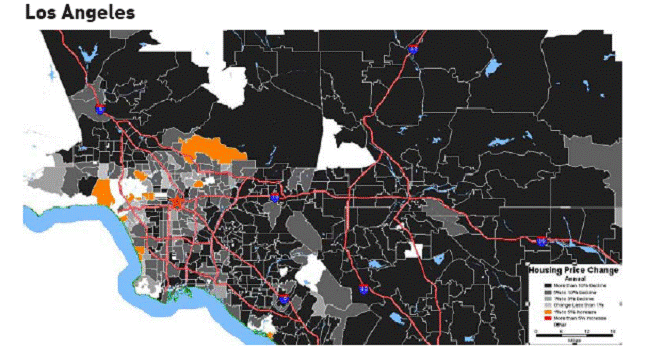In my previous post, I presented evidence that the oil price increase over 2007:H2-2008:H1 made a significant contribution to the slowdown in consumption spending in general and decline in spending on domestic automobiles in particular. Here I discuss why this should be regarded as a key development that turned the slowdown in growth into a recession.
 |
One way to put this in perspective is to compare what happened in 2007-2008 with what we saw in 1990-91. Prior to Iraq’s invasion of Kuwait in August 1990, the U.S. economy had been growing slowly due to a weak housing sector. The sudden loss in oil production from Iraq and Kuwait resulted in one of the biggest increases in oil prices on record, which unquestionably contributed to the downturn in consumption spending and the auto sector that were key factors in turning that slowdown into the recession of 1990-91. The graph above shows that although the oil price increase during 2007-08 was more gradual than what we saw in the fall of 1990, the cumulative magnitude was quite similar.
The next graph compares the path of employment in the auto sector during the two recessions. The red line shows the cumulative change in the number of workers employed in motor vehicles and parts manufacturing subsequent to July 1990. This sector had shed 94,000 jobs by the low point in March of 1991. For comparison, we’ve seen 150,000 jobs lost in this sector by October of this year. Although this is a small number relative to the total labor force, another hundred thousand jobs would have made the difference for calculations such as whether the year-over-year employment growth was positive or negative as of the end of the summer, which some might take as a criterion for declaring that a recession had begun in the first half of this year.
 |
| Quarter | GDP | GDI |
|---|---|---|
| 2007:Q4 | -0.2% | -0.8% |
| 2008:Q1 | +0.9% | -0.5% |
| 2008:Q2 | +2.8% | +0.7% |
| 2008:Q3 | -0.5% | -1.2% |
The decline in automobile production alone subtracted about $30 billion (in 2000 dollars) from U.S. real GDP in 1990:Q4-1991:Q1, which was enough to reduce the annual GDP growth rate by about 0.9% for each of these quarters. Autos subtracted more than $30 billion (in 2000 dollars) from U.S. real GDP in 2008:Q1-Q2, though due to a larger economy, this only subtracted about half a percent from the annual GDP growth rate for these quarters. But once again, I’d argue that autos by themselves would have been enough to make the difference between whether you characterize the first half of 2008 as slow growth or recession. The table at the right gives the actual annual growth rates for total GDP (left column) and gross domestic income (right column), which the NBER Business Cycle Dating Committee said it also looked at this time in declaring that the recession had actually started at the end of 2007. Without the slowdown in consumption in general or the strong hit to autos in particular, again I don’t think we would be characterizing these quarters as the beginning of an economic recession.
But why, some readers may ask, am I talking so much about the relatively modest contribution of autos, when housing was such an obviously bigger story? It is true that lost jobs and income from the housing sector were significantly bigger than what we saw in automobile manufacturing. But the problems in housing had been around for some time prior to 2008 without causing a recession. Between 2006:Q2 and 2007:Q3, the ongoing decline in residential fixed investment subtracted 1.04% from the average annual growth rate of U.S. real GDP. Over 2007:Q4 to 2008:Q3, housing only subtracted 0.91% on average. Something else made the difference in turning the latter episode into a recession, and it seems to me that consumption spending and automobile purchases were a key factor.
There is also an interaction effect between the spike in gasoline prices and the problems in housing, with rising gasoline prices delivering the fatal blow to many exurban communities. Joe Cortright (hat tip: MuniNet) notes for example that zip codes closest to the metropolitan center of Tampa actually saw increases in house prices, with the steepest declines in the outlying areas.
 |
The same is true for the Los Angeles area.
 |
And if I am correct that the oil shock contributed directly to slower GDP growth during 2007:H2 and 2008:H1, this in turn would have implications of its own for housing. For example, a recent study I did of the demand for housing (which appeared in the most recent issue of the Journal of Monetary Economics) estimated that a 1% drop in real GDP is typically associated with a 2.6% drop in new home sales. I see little basis for disputing that the oil price increase was one factor pushing home sales and house prices down.
Of course, we’ve now reached a point where defaults on home mortgages and the resulting financial chaos became a factor far bigger than both housing and autos and have put us in a hole much too deep for $1.50 gasoline to bring us back out.
How big would our current problems be if the blue line in the first graph had been flat instead of tilted so dramatically up? I don’t claim to know that. But here’s one thing of which I am very much persuaded: if gasoline prices had stayed at $2.50 a gallon through 2008, the NBER Business Cycle Dating Committee would not have declared that the current recession began in December 2007.
For those of you who will be attending the American Economic Association meeting in San Francisco, I’ll have more to say about these issues on Sunday in a session also featuring Olivier Blanchard and Lutz Kilian.
JDH wrote:
“But here’s one thing of which I am very much persuaded: if gasoline prices had stayed at $2.50 a gallon through 2008, the NBER Business Cycle Dating Committee would not have declared that the current recession began in December 2007.”
Which begs a question – if gasoline prices had averaged $2.50 a gallon through 2008, when might the NBER have otherwise declared the previous business expansion to have peaked?
I have no problem believing that oil prices contributed greatly to the subsequent economic downturn. If congress had not encouraged, cajoled, forced, mortgage lenders to buy ever deeper into a pool of relatively unqualified applicants, would we have seen the financial crisis that we saw? Absent the oil shock, how much longer could this segment have continued growing anyway? With the risk of the overall mortgage portfolio growing exponentially as each new marginal loan’s risk exceeded anything purchased before, it would not seem to take much of a shock, imo, to bring it to a rapid end.
Cortright’s analysis makes perfect intuitive sense but, I doubt if this effect alone could have precipitated the housing crisis. $2.50 a gallon gas may have prolonged the collapse for a while but, the collapse was built in and coming eventually anyway.
Without the mortgage crisis, this would probably seem to be a natural slowdown caused by the rapid increase in gas prices and subsequent effects on autos and people’s wallets. Without the mortgage crisis, the current level of oil would have already eased the recession and we might have seen the shortest recession in history. Of course, that would assume sane government policies from the next congress and PEBO. Isn’t this a great time to launch our war on climate change? How much misery will Americans take in the name of saving the planet?
JDH “Of course, we’ve now reached a point where defaults on home mortgages and the resulting financial chaos became a factor far bigger than both housing and autos and have put us in a hole much too deep for $1.50 gasoline to bring us back out.” Yep.
Professor,
It seems that you approach but do not touch the “third rail” of economics, one that John Taylor recently, wholeheartedly, embraced.
If high gas prices were a significant contributing factor to the recession, and if 1% policy rates in 2004 contributed (caused?) to high gas prices, then perhaps, just perhaps, there is a cost to ZIRP and near-ZIRP monetary policy.
The problem with counter-cyclical monetary policy is in its asymmetry: its easy to start, hell to stop. Thus, in every downside of a cycle, proposals for monetary stimulus land like seagulls on an incoming shrimp boat. Later, we get “measured paces”, “considerable periods,” and similar cautious, politically-influenced hand-holding of fragile recoveries. In short, this episode of monetary easing may well lay the groundwork for (shudder) an even greater recession/depression in the future: I’ve heard few economists mention this possibility.
David Pearson: This is what I was saying last March.
Professor,
I think what would be helpful is if you fully explore the implications of your recommendation for a medium term at-all-costs inflation target. Here are some pertinent questions:
-how will the financial system replace the withdrawn $1.5tr (and counting) when the level of capital inflows from reserve-accumulating countries will be severely diminished? Which balance sheets, exactly, will grow as the Fed’s shrinks? How will these balance sheets achieve the kind of leverage that the former owners of the Fed’s holdings had? If they don’t have the same kind of leverage, where will the capital come from (equity capital) to support the purchases?
-at what point in the incipient recovery will the Fed remove reserve funds, what will be the speed of that removal, how will it impact credit spreads? What signal of economic solidity will the Fed watch for?
-what will the Fed do if, as in 1937, removal of reserves causes a recession? Will it reinject the reserves?
I still insist that all this means is that low oil prices will result in a rocketing recovery by mid-2009.
Both auto sales and auto related employment will be a huge negative factor in 2009. I believe Obama will have his work cut out for him in the auto sector alone.
I’m not convinced, Doc.
Per the BEA website, seasonally adjusted annualized auto sales peaked in Jan. ’06 at 8.5 million, while truck sales peaked in Jul. ’05 at 13.1 million. I.e., auto and truck sales have been in decline for a long time. Without a doubt, the decline has accelerated these past six months or so.
I think the cause of the decline in auto sales is not the spike in gasoline prices. I think the cause is the lurking variable of debt overhang/financial obligations. In the records that date to ’80, DSR first went above 14% in Q2 ’05 and FOR first went above 19% in the same quarter, about the same time that auto and truck sales peaked.
http://www.federalreserve.gov/releases/housedebt/default.htm
Unfortunately, with employment collapsing and incomes with it, those two ratios, DSR and FOR, are going to skyrocket (they are alreading moving up from their local minima in Q2 ’08).
The populist objective of “getting America off carbon fuels” should give way to a quest for an economically optimal global warming policy, perhaps along lines proposed by William Nordhaus. More attention paid to the potential costs of drastic reductions in the supply of carbon fuels might avoid a weakening of America that can bring other perils easily as serious as the threat of global warming.
Global warming is a hoax that simple-minded sheep fall for.
However, CO2 in the atmosphere certainly causes ocean acidification. THAT is a much more serious, much more measurable effect of CO2, unlike ‘global warming’, which is bogus.
Strangely, the ‘global warming’ sheep are not worried about ocean acidification.
Professor,
Something to consider: imagine a series in which the n-1 time period policy to stop credit deflation is always thought to be flawed, but the n period one is thought necessary. Here’s what it would look like.
1998 necessary
1998 flawed
2002 necessary
1998 flawed
2002 flawed
2008 necessary
1008 flawed
2002 flawed
2008 flawed
???? necessary
See where this is going?
you said:
OK: so why gas price went up so much in the first half of 2008?
Because financial analysts had been claiming so for more than a year.
They had been telling us that emerging market demand for energy would have grown forever and supply would have been more and more scarce.
So my conclusion is that the financial sector is itself the problem. And the correction is under way.
If “Global Warming is a hoax, then so to is:
– Global Population Growth
– Global Species Extinction
But, wait, Population has exploded since 1776, Species are in world wide decline, and the Arctic has lost 2 Trillion Ton’s if ice.
GK, maybe We aren’t the “simple-minded sheep”.
I suspect that increasing commute times were a much larger factor in the dying of fringe suburban housing than the direct effect of gas prices. Increasing congestion increased both the time and amount of gas burned during a trip. Probably contributed to the run up in price until people stopped working and investing.
I wonder how much of our mortgage debt oil producing countries financed based on rising oil prices.
What I mean is, how much mortgage debt and MBS did oil producers buy with increased profits instead of investing in production and maintenance?
Why did no one notice that high gas prices were causing decreased fuel efficiency and effectively decreasing supply?
Mike99,
Once again, you prove to be part of a non-thinking cult.
Ocean acidification is a much more serious issue, happening much sooner, than ‘global warming’.
Unfortunately, the god (Al Gore) of your fanatical religion has not talked about ocean acidification, therefore, you deny it exists.
The simple fact is, the world was warmer in Roman times than today. Wine was produced in Britain (which today is too cold for Vinyards), and animals found only in Africa today (lions, leopards) were present in Greece, Italy, and Spain.
Ocean acidification is much more serious. Your denial of this is totally irresponsible behavior towards the environment.
You need to step back from your fanatical religion and start thinking.
Medieval warmth and English wine (http://realclimate.org/index.php?p=322)
BTW, what will happen when (and if) there is a recovery in the economy and consumption of oil starts gaining traction again? The IEA has warned again of a supply crunch after 2010…
We are seeing the brewing of the next oil crunch…
Arguing whether or not global warming exists or not is pointless at this moment. I think the real issue is Peak Oil. Whether you believe it or not we will run out of oil someday. I think the speedy decent into running out of oil will have recessions as speedbumps along the way. And each successive recession will get worse due to the contraction caused by the ever escalating price. During the recession the price will come down and in recovery the price will go back up until oil becomes so rare it is economically infeasible to obtain.
We should be focusing on ecofriendly alternatives to oil. Not because of global warming or ocean acidification, but because we will need the alternative (and having clean air to breathe is a pretty nice consequence.) For those of you who don’t like to breathe, this argument will make no sense.
As for the price of oil, I think it will start going back up during 2009. My reasoning is that OPEC wants this to happen. If your supplier wants to cause a increase in price they will use the laws to supply and demand to make it happen. If I had to guess, I would speculate that OPEC would like $75 to $100 barrel oil (think what that would do to the value of the dollar). If OPEC does manage to increase oil to this range we are in for a long hard recession, especially for suburbanites like me.
Have to admire the tenacity of GK that other views are merely memberships in some…well, religious cults…but that with due diligence (his) and patience (yours) he can restore his market share and enforce his predominance…with your help…you fatheads know who you are…nearly.
I am pushing back against JDH’s promotion of The Oil Price Switch as a solenoid for the Recession…Izit because the house is a much larger item for me than the EOR it might represent for James?
I have contended for months that the high oil prices are the most significant factor in the current recession and that the “stimulus” package of spring 2008 was a net de-stimulus. (Not close to an offest of the cummulative cash taken out of the economy due to the retail consumer’s cost of gasoline purchases.)
I have redone my analysis of DOE price and sales data through Jan 2009 and I find that since January 2003, the US economy lost $360B or $796B of spending power due to gasoline prices versus a $2/gal or $1.50/gal, respectively. These “lost” consumer dollars were balanced by either adding consumer debt (short-term) or buying less of everything else.
The spring stimulus was too little too late.
The posted analysis shows the time lag and the multiplier for the “lost” dollars reaching other products like autos. The multiplier I believe comes from additional “lost” dollars from food and other products that directly rise in price to pass through gasoline prices. The lag matches “dollar storage” in added debt/ less savings.
I have the graph but cannot paste it.
So what effect will the new stimulus have?
Could a gasoline tax be a timely way to pay for some of this red ink and hedge a new oil price ramp-up?
Ben, not only was there financial loss due to high gas prices, there was also decreased productivity (ie, in addition to economic contraction in response to increased prices, there was also decreased economic output because of decreased productivity). It’s been happening since 2005/06, when increasing prices really started to affect people. I started to notice in 2007, even before looking at the data. When Kevin Drum posted enthusiastically about decreased consumption, I noticed a big discrepancy in the decline of output (vehicle miles traveled) and the decline in gasoline consumption (the decline in output was much larger than the decline in consumption).
I’ve since looked into the data and confirmed that not only has MPG been negatively correlated with price, it’s often been that way for a while. And, this was happening when driving had plateaued and people were switching to more fuel efficient vehicles.
A gas tax will probably cause this trend to continue, and it’s hard to get the efficiency we had back once it’s lost because the increased congestion caused by people reacting to high gas prices prevents efficient behavior from being effective (you can only drive as fast as the cars in front of you, unless you can go around safely).
Fuel efficiency from 1998 to May 2008 here and here.
This shows what’s been happening through August.
Here is what I expect in the coming months.
Oh, it should also be pointed out the the decreased productivity isn’t just for fuel use. The cost in time is probably much greater.
I agree the issue isnt whether we are going out of oil or money because at the moment we arent. The issue is time to produce demands to meet fast growing economies , such as China’s and India.
Doesn’t anyone else find it strange that the Bush/Cheney administration is out, and just previous to the November election, prices went down, and all that darned “speculation” just disappeared. Now, sure there have been a few refineries back on line and so forth….. but folks, the GOP’s brownosers got filthy stinkin’ rich. Supply and demand is all good and fine, but when the table is tilted, it’s not the determining market force; greed is. Now we are beginning to see the refractory period from the oil and financial thefts that have occurred. Prefferred investors and officers and holding companies are brimming with assets and money. The rest of us will get to pay it all back. After the healing, normal market forces will re-enter the discussion in reality.